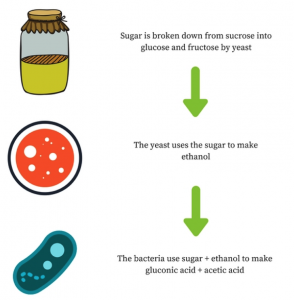What is it?
You may be wondering, “What is kombucha?”. For starters, Kombucha is a recently popularized probiotic beverage consumed for its anti-inflammatory and antioxidant properties. Now you may be wondering, “What is a probiotic?”. The World Health Organization defines a probiotic as “live microorganisms which when administered in adequate amounts confer a health benefit on the host.”
For a product to be considered a probiotic, Lynne McFarland, an associate professor at the University of Washington explains, “…they have to be alive. They can be a bacteria or a yeast. They have to be used in an adequate dose, and they have to have some proven beneficial health effect.”
How is it made?
Kombucha derives from a process known as fermentation. So, before we continue on about Kombucha, let’s explore this antique method for extending the life and safety of food.
Kombucha fermentation is an aerobic process in which sugar and tea are converted, in the presence of a SCOBY, or a symbiotic colony of bacteria and yeast, to “a lightly carbonated, slightly sour, and refreshing drink, which is composed of several acids, 14 amino acids, vitamins, and some hydrolytic enzymes,” (1). Specifically, Kombucha contains the following vitamins and minerals: Vitamins B1, B2, B6, B12, and C
Minerals Copper, Iron, Manganese, Nickel, and Zinc (1)
Preferable conditions for kombucha fermentation
Fermentation is influenced by many factors such as time, temperature, and pH. Therefore, any changes in the fermentation condition may affect the final product. With that being said, below are general recommendations based on the finding of current literature (1).
Time: Average of 15 days
Temperature: Generally, between 22-30 degrees Celsius
pH: No lower than 3
The science
Research has been conducted to examine antimicrobial, antioxidant, anti-inflammatory, and anticarcinogenic properties of Kombucha (1). The findings of one particular study is highlighted below. However, further research is warranted to better understand the characterization of its active components and their evolution during fermentation.
Anti-inflammatory properties (2)
• Fermented beverages of oak effectively down-regulated the production of nitric oxide
• Pro-inflammatory cytokines (TNF-alpha and IL-6) in macrophages were stimulated with lipopolysaccharide.
• Phytochemical compounds, present in kombucha analogues from oak, decrease oxidative stress.
Make your own!
Visit The Kitchn, an online food magazine, at https://www.thekitchn.com/how-to-make-kombucha-tea-at-home-cooking-lessons-from-the-kitchn-173858 for help on how to make your very own Kombucha.
References
(1) Villarreal-Soto SA, Beaufort S, Bouajila J, Souchard JP, Taillandier P. Understanding Kombucha Tea Fermentation: A Review. Journal of Food Science. 2018; 83(3): 580-588.
(2) Vázquez-Cabral BD, Larrosa-Pérez M, Gallegos-Infante JA, Moreno-Jiménez MR, González-Laredo RF, Rutiaga-Quiñones JG, Gamboa-Gómez CI, Rocha-Guzmán NE. Oak kombucha protects against oxidative stress and inflammatory processes. Chemico-Biological Interactions. 2017; 272: 1-9.
(3) Chakravorty S. Kombucha tea fermentation: Microbial and biochemical dynamics. International Journal of Food Microbiology. 2016; 220: 63-72.
Written by Nicole Lindel ~ Nutrition Education Master’s Student at Columbia University
